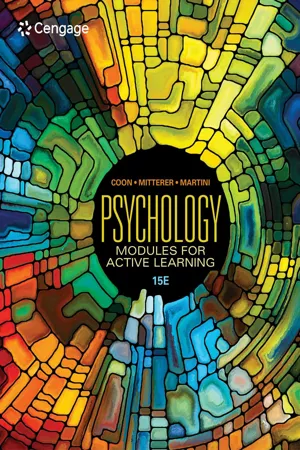
Psychology
Modules for Active Learning
- English
- PDF
- Available on iOS & Android
Psychology
Modules for Active Learning
About this book
Coon, Mitterer and Martini's bestselling PSYCHOLOGY: MODULES FOR ACTIVE LEARNING, 15th Edition combines clear learning objectives, an engaging style, appealing visuals and detailed coverage of core topics and cutting-edge research in one fascinating text. Fully updated, it includes new content that takes you beyond learning psychology as a set of facts to learning skills that make a difference in your everyday life and future career. Active learning modules teach you about information literacy, behaving ethically, giving memorable presentations, leadership, teamwork, coping with stress, optimism and many other topics that you can apply right away. The text is also available with MindTap, a digital learning experience featuring an e-book, videos, study tools and more.
Tools to learn more effectively

Saving Books

Keyword Search

Annotating Text

Listen to it instead
Information
Table of contents
- Cover
- Dedication
- About the Authors
- Brief Contents
- Contents
- Preface
- Module 1: The Psychology of Reflective Studying
- Module 2: Introducing Psychology: Psychology, Critical Thinking, and Science
- Module 3: Introducing Psychology: Psychology Then and Now
- Module 4: Introducing Psychology: The Psychology Experiment
- Module 5: Introducing Psychology: Descriptive Research Methods
- Module 6: A Psychologist’s Skill Set: Information Literacy
- Module 7: Brain and Behavior: The Nervous System
- Module 8: Brain and Behavior: Brain Research
- Module 9: Brain and Behavior: Hemispheres and Lobes of the Cerebral Cortex
- Module 10: Brain and Behavior: The Subcortex and Endocrine System
- Module 11: A Psychologist’s Skill Set: Self-Regulation
- Module 12: Human Development: Heredity and Environment
- Module 13: Human Development: Emotional and Social Development in Childhood
- Module 14: Human Development: Language and Cognitive Development in Childhood
- Module 15: Human Development: Adolescence and Adulthood
- Module 16: A Psychologist’s Skill Set: Behaving Ethically
- Module 17: Sensation and Perception: Sensory Processes
- Module 18: Sensation and Perception: Vision
- Module 19: Sensation and Perception: The Nonvisual Senses
- Module 20: Sensation and Perception: Perceptual Processes
- Module 21: Sensation and Perception: Perception and Objectivity
- Module 22: A Psychologist’s Skill Set: Effective Communication
- Module 23: Consciousness: States of Consciousness
- Module 24: Consciousness: Sleep and Dreams
- Module 25: Consciousness: Psychoactive Drugs
- Module 26: A Psychologist’s Skill Set: Metacognition
- Module 27: Conditioning and Learning: Classical Conditioning
- Module 28: Conditioning and Learning: Operant Conditioning
- Module 29: Conditioning and Learning: Observational Learning
- Module 30: Conditioning and Learning: Cognitive Learning
- Module 31: A Psychologist’s Skill Set: Behavioral Self-Management
- Module 32: Memory: Memory Systems
- Module 33: Memory: Measuring Memory
- Module 34: Memory: Forgetting
- Module 35: Memory: Exceptional Memory
- Module 36: A Psychologist’s Skill Set: Giving Memorable Presentations
- Module 37: Cognition and Intelligence: Modes of Thought
- Module 38: Cognition and Intelligence: Problem Solving
- Module 39: Cognition and Intelligence: Creative Thinking and Intuition
- Module 40: Cognition and Intelligence: Intelligence
- Module 41: A Psychologist’s Skill Set: Creativity and Innovation
- Module 42: Motivation and Emotion: Overview of Motives and Emotions
- Module 43: Motivation and Emotion: Motivation in Detail
- Module 44: Motivation and Emotion: Emotion in Detail
- Module 45: A Psychologist’s Skill Set: Positivity and Optimism
- Module 46: Human Sexuality: Sex and Gender
- Module 47: Human Sexuality: The Human Sex Drive, Response, and Attitudes
- Module 48 Human Sexuality: Sexual Problems
- Module 49: A Psychologist’s Skill Set: Diversity and Inclusion
- Module 50: Personality: Overview of Personality
- Module 51: Personality: Trait Theories
- Module 52: Personality: Psychodynamic and Humanistic Theories
- Module 53: Personality: Behavioral and Social Learning Theories
- Module 54: A Psychologist’s Skill Set: Leadership
- Module 55: Health Psychology: Overview of Health Psychology
- Module 56: Health Psychology: Stressors
- Module 57: Health Psychology: Coping with Stress
- Module 58: Health Psychology: Stress and Health
- Module 59: A Psychologist’s Skill Set: Stress Management
- Module 60: Psychological Disorders: Defining Psychopathology
- Module 61: Psychological Disorders: Psychotic Disorders
- Module 62: Psychological Disorders: Mood Disorders
- Module 63: Psychological Disorders: Anxiety, Anxiety-Related, and Personality Disorders
- Module 64: A Psychologist’s Skill Set: Perseverance
- Module 65: Therapies: Treating Psychological Distress
- Module 66: Therapies: Psychodynamic, Humanistic, and Cognitive Therapies
- Module 67: Therapies: Behavior Therapies
- Module 68: Therapies: Medical Therapies
- Module 69: A Psychologist’s Skill Set: Managing Mental Health
- Module 70: Social Psychology: Social Behavior and Cognition
- Module 71: Social Psychology: Social Influence
- Module 72: Social Psychology: Prosocial Behavior
- Module 73: Social Psychology: Antisocial Behavior
- Module 74: A Psychologist’s Skill Set: Teamwork
- Module 75: Applied Psychology: Industrial/Organizational Psychology
- Module 76: Applied Psychology: Environmental Psychology
- Module 77: Applied Psychology: The Psychology of Law, Community Psychology, and Sports Psychology
- Module 78: A Psychologist’s Skill Set: Career Preparation
- Module 79: A Psychologist’s Skill Set: Appendix: Behavioral Statistics
- References
- Name Index
- Subject Index/Glossary
Frequently asked questions
- Essential is ideal for learners and professionals who enjoy exploring a wide range of subjects. Access the Essential Library with 800,000+ trusted titles and best-sellers across business, personal growth, and the humanities. Includes unlimited reading time and Standard Read Aloud voice.
- Complete: Perfect for advanced learners and researchers needing full, unrestricted access. Unlock 1.4M+ books across hundreds of subjects, including academic and specialized titles. The Complete Plan also includes advanced features like Premium Read Aloud and Research Assistant.
Please note we cannot support devices running on iOS 13 and Android 7 or earlier. Learn more about using the app